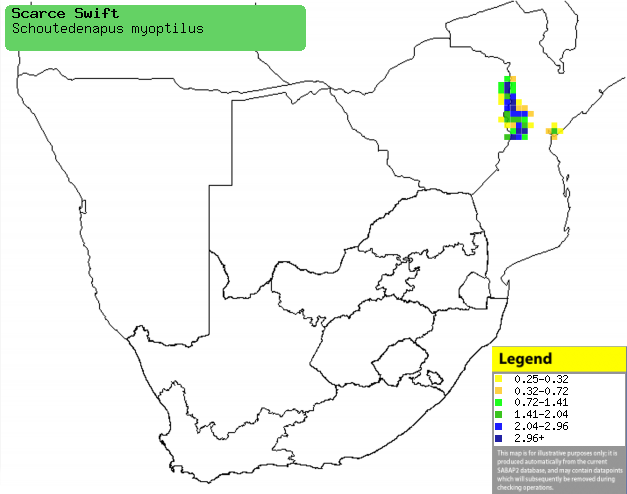|
Schoutedenapus myoptilus (Scarce
swift)
Skaarswindswael [Afrikaans]; Shoa-gierzwaluw [Dutch];
Martinet de Shoa [French]; Maussegler [German]; Andorinhão de Shoa [Portuguese]
Life
> Eukaryotes >
Opisthokonta
> Metazoa (animals) >
Bilateria >
Deuterostomia > Chordata >
Craniata > Vertebrata (vertebrates) > Gnathostomata (jawed
vertebrates) > Teleostomi (teleost fish) > Osteichthyes (bony fish) > Class:
Sarcopterygii (lobe-finned
fish) > Stegocephalia (terrestrial
vertebrates) > Tetrapoda
(four-legged vertebrates) > Reptiliomorpha > Amniota >
Reptilia (reptiles) >
Romeriida > Diapsida > Archosauromorpha > Archosauria >
Dinosauria
(dinosaurs) > Saurischia > Theropoda (bipedal predatory dinosaurs) >
Coelurosauria > Maniraptora > Aves (birds) > Order: Apodiformes >
Family: Apodidae
Distribution and habitat
Occurs in Uganda, Kenya and eastern DRC, with small,
isolated populations elsewhere in sub-Saharan Africa. Within southern
Africa it is restricted to
Zimbabwe's eastern highlands and adjacent Mozambique. It generally prefers crags
and precipices in moist forest highlands, especially if near a waterfall.
|
 |
|
Distribution of Scarce swift in southern Africa,
based on statistical smoothing of the records from first SA Bird Atlas
Project (©
Animal Demography unit, University of
Cape Town; smoothing by Birgit Erni and Francesca Little). Colours range
from dark blue (most common) through to yellow (least common). |
Movements and migrations
It is thought to be a breeding migrant to eastern Zimbabwe,
staying from about July-March.
Food
Mainly eats flying insects, such as ant and termite alates,
sometimes joining mixed-species foraging flocks.
Breeding
Barely anything is known about its breeding habits, besides that egg-laying season is from September-January and it probably nests in
large fissures in high rock cliffs.
Threats
Not threatened.
References
-
Hockey PAR, Dean WRJ and Ryan PG 2005. Roberts
- Birds of southern Africa, VIIth ed. The Trustees of the John Voelcker
Bird Book Fund, Cape Town.
|
